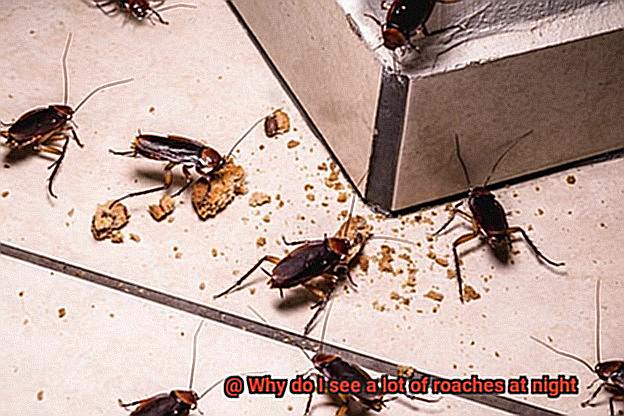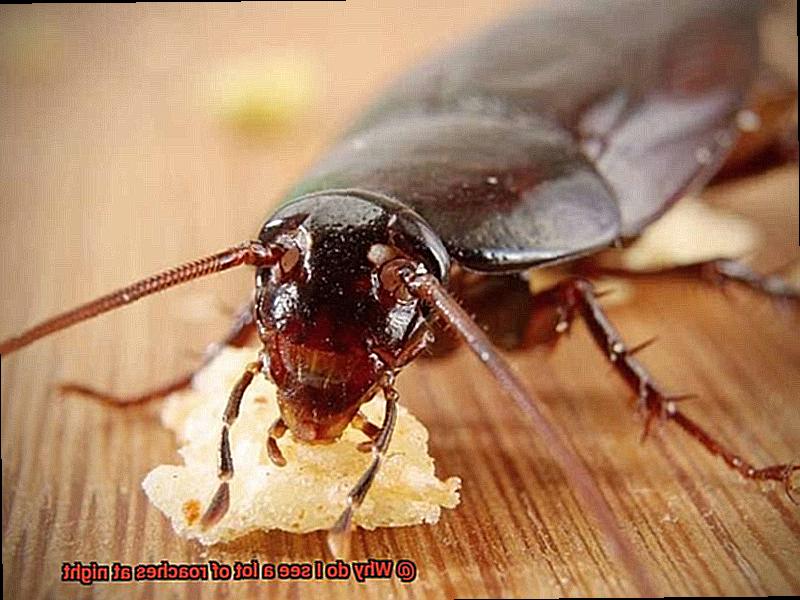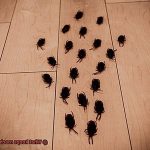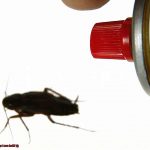Cockroaches – these creepy crawlies are not only unsightly but also notorious for spreading diseases. But have you ever wondered why they seem to come out of hiding at night? Well, wonder no more. There’s a reason behind their nocturnal habits, and we’re here to shed some light on the subject.
Picture this: it’s past midnight, and you head to the kitchen for a glass of water. Suddenly, you see several roaches scurrying around. Gross, right? But don’t worry; it’s not your fault. Cockroaches are naturally nocturnal creatures that prefer to hide during the day and come out at night when it’s dark and quiet.
At night, there is less human activity that could disturb them, allowing them to move around freely in search of food and water. And speaking of food, cockroaches love kitchens – especially warm and humid ones with plenty of food scraps lying around.
But wait – there’s more. Did you know that cockroaches can survive without food for up to a month? That’s why they can lurk in your home undetected for so long before you even realize they’re there.
So if you’re wondering why you see a lot of roaches at night, now you know. Their natural nocturnal behavior combined with their affinity for kitchens makes nighttime the perfect opportunity for them to scavenge for food and shelter.
But don’t fret; there are ways to prevent these pesky critters from invading your home. Implementing proper sanitation practices like cleaning up spills promptly and sealing all cracks and crevices can go a long way in keeping them at bay.
In conclusion, understanding the reasons behind cockroach behavior can help us take preventive measures against them. So next time you encounter one of these unwelcome guests in your home at night, remember – knowledge is power.
What are Cockroaches?
Contents
Cockroaches are the creatures that scuttle across the floor when you least expect it, and they can be a real nightmare for homeowners. But what exactly are they? Cockroaches belong to the order Blattodea and have been around for over 300 million years. With over 4,000 species, most of them not pests, a few have adapted to human dwellings and become nuisances.
These insects are usually brown or black in color, with a flat, oval-shaped body. They have long antennae and six legs, and depending on the species, can range in size from a few millimeters to several centimeters in length. These nocturnal creatures come out at night to search for food and water, and they prefer warm, humid conditions. You’ll often find them in kitchens, bathrooms, and other areas where food is prepared or stored.

One of the reasons cockroaches are most active at night is because they’re less likely to encounter predators during this time. Many of their natural predators, such as birds and lizards, are asleep during the night, making it a safer time for cockroaches to move around.
Cockroaches also have a strong aversion to light. They prefer dark environments and will avoid well-lit areas. This is why you may see them scurrying away when you turn on a light.
Cockroaches have a keen sense of smell that helps them locate food and water sources. At night when the house is quiet and there are fewer distractions, cockroaches can easily detect food crumbs and spills on the floor or countertops. They’re attracted to any source of food or water, which is why it’s important to keep your kitchen and bathroom clean and dry.
Besides being a nuisance, cockroaches can be a health hazard as they can carry diseases such as salmonella and E.coli. They can also trigger allergies and asthma in some people. It is important to control cockroach infestations using effective methods such as baits, sprays, and traps.
Why Are Cockroaches Nocturnal?
Cockroaches have been around for over 300 million years, and one of their most defining characteristics is their nocturnal behavior. But why do these pesky pests prefer to come out at night?
One reason is that cockroaches are highly adaptable creatures that have evolved to avoid predators. During the day, many predators like birds and lizards are active, so cockroaches have learned to stay hidden during daylight hours to increase their chances of survival. This allows them to avoid becoming an easy prey for predators.
Another reason why cockroaches prefer to be active at night is because they are expert scavengers that can eat just about anything. At night, when humans and pets are asleep, there is less activity in the home and fewer disturbances, making it easier for cockroaches to find food. They can scurry around without fear of being caught or detected.
In addition to avoiding predators and finding food, cockroaches have also adapted to thrive in the dark because they are highly sensitive to light. These pests have photoreceptors on their bodies that allow them to detect changes in light levels. During the day, when there is more light, these receptors can become overstimulated, making it difficult for the insects to navigate or find food.
Overall, the nocturnal behavior of cockroaches is a survival tactic that has helped them thrive in their environment for millions of years. While it can be frustrating for homeowners dealing with an infestation, understanding why cockroaches are most active at night can help with prevention and control efforts.
If you want to prevent a cockroach infestation, there are a few things you can do. Keep your home clean and free of crumbs and spills that could attract these pests. Seal up any cracks or holes in your home’s foundation or walls where cockroaches could enter. And consider using baits, sprays, or traps to help eliminate these pests if they manage to creep in.
How Do Cockroaches Sense Light?
As an expert on the topic, I can tell you that the answer lies in their unique ability to detect light through their eyes and antennae.
Cockroaches have two compound eyes, each made up of thousands of tiny lenses. These lenses allow them to detect even the slightest changes in light intensity and direction, making them highly sensitive to their surroundings. In fact, studies have shown that cockroaches can see in low light conditions, which is why they are most active during the night.
But that’s not all. Cockroaches also use their antennae to sense light. The antennae contain sensory cells that are sensitive to light, allowing the cockroach to navigate and avoid obstacles in dark environments. This makes them incredibly skilled at finding their way around in the dark.
So why does this matter? Understanding how cockroaches sense light can help homeowners take preventative measures to reduce the chances of an infestation. For instance, sealing cracks and crevices or turning on lights at night can deter them from coming out.
What Attracts Cockroaches at Night?
These nocturnal pests are attracted to a few key things that you can easily address to make your home less appealing to them.
Food is a major draw for cockroaches. These creatures will feast on anything organic, from leftover food to crumbs and even garbage. Leaving food out overnight or failing to clean dirty dishes in the sink can attract cockroaches to your home. So, make sure to clean up any spills or messes promptly and store food in sealed containers.
Water is another essential element that cockroaches need to survive. Leaky pipes, standing water in sinks or tubs, and even condensation on windows can all provide a source of water for these pests. Fix any leaks and wipe up any excess moisture to make your home less attractive to cockroaches.
Cockroaches also prefer warm temperatures between 70-80 degrees Fahrenheit, which is why they are more commonly found in tropical climates. Keeping your home cool and dry by using dehumidifiers and air conditioning units can help reduce humidity levels and make your home less hospitable to these pests.
Finally, cockroaches seek shelter in dark and damp places during the day. Cracks and crevices in walls and floors provide ideal hiding spots for them, as do cluttered areas such as piles of newspapers or cardboard boxes. Regularly cleaning and decluttering your home can help eliminate hiding places for cockroaches.
Preventing a Roach Infestation
If so, preventing a roach infestation is crucial to keep your home roach-free. Luckily, I’m here to share some essential steps that you can take to prevent these pesky pests from taking over.
Roaches are attracted to food, water, and shelter, making it essential to keep your home clean and dry. This means wiping down counters, sweeping floors, and fixing any leaks or moisture issues. By denying them their basic needs, you’re already one step ahead in preventing an infestation.
Sealing up any entry points into your home is another effective way to prevent a roach infestation. Roaches can enter through small cracks and crevices, so it’s vital to seal up any gaps around windows, doors, and pipes with caulk or weatherstripping. This way, you’re blocking their entry points and keeping them outside where they belong.
Decluttering is also crucial in preventing a roach infestation. Roaches love hiding in piles of items, so getting rid of clutter denies them an ideal hiding place. A clean and organized home is the best defense against these unwanted guests.
If you have pets, be sure to keep their food and water bowls clean and stored away at night. Roaches are attracted to pet food, so leaving it out can attract them into your home. Keeping pet food in a sealed container can also help prevent an infestation.
Using baits and traps is another effective way to prevent roach infestations. These products can be placed in areas where roaches are likely to hide, such as under sinks and behind appliances. They are a great addition to your prevention strategy.
Lastly, regular cleaning and maintenance are essential in preventing a roach infestation. By wiping down counters, sweeping floors, fixing leaks or moisture issues regularly, you’re creating an environment that is not attractive to roaches or other pests.
rJJNyFp4sZ8″ >
Conclusion
In conclusion, the sight of roaches scurrying around at night can be unsettling. But understanding their behavior can help us take preventative measures against these pesky pests. Cockroaches are naturally nocturnal creatures and tend to hide during the day. They come out at night when it’s dark and quiet, seeking warm and humid environments with plenty of food scraps lying around.
To keep them at bay, proper sanitation practices like cleaning up spills promptly and sealing all cracks and crevices are crucial. Cockroaches can survive without food for up to a month, making it essential to deny them access to any potential food sources in your home. By sealing entry points into your home, decluttering regularly, keeping pet food clean and stored away at night, using baits and traps effectively, regular cleaning and maintenance of your home can prevent roach infestations.
It’s worth noting that cockroaches have been around for over 300 million years and have evolved to avoid predators by staying hidden during daylight hours. So nighttime is the perfect opportunity for them to scavenge for food and shelter. However, homeowners can deter them from coming out by turning on lights at night.
Remember that knowledge is power when dealing with these pesky pests. By understanding what attracts them at night and how they sense light, you can take preventative measures to reduce the chances of an infestation. Keep your home clean and free of crumbs or spills that could attract these pests; seal up any cracks or holes in your home’s foundation or walls where cockroaches could enter; fix any leaks or wipe up any excess moisture to make your home less attractive to cockroaches.






